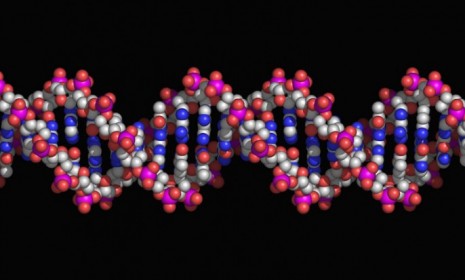Can your DNA predict when you'll die?
British researchers identify a small part of the chromosome that may help us measure how long our natural lives will be

A free daily email with the biggest news stories of the day – and the best features from TheWeek.com
You are now subscribed
Your newsletter sign-up was successful
What if your doctor could tell you how long your life would be — while you were still young? That's the possibility offered by a study released this week identifying a piece of DNA that may serve as a measuring stick for longevity. Here, a brief guide to the research:
What part of the DNA is it?
The telomere — a protective cap on on the end of chromosomes, which are thread-like strands of DNA. Essentially, a telomere serves a "similar purpose to the plastic caps at the end of shoelaces," says Loren Grush at Fox News, and keeps chromosomes from unraveling. Researchers from the University of Glasgow in Scotland think that the length of a person's telomere, which wears down over time, could be used to estimate a person's "expiration date" — or how long they can expect to live.
The Week
Escape your echo chamber. Get the facts behind the news, plus analysis from multiple perspectives.

Sign up for The Week's Free Newsletters
From our morning news briefing to a weekly Good News Newsletter, get the best of The Week delivered directly to your inbox.
From our morning news briefing to a weekly Good News Newsletter, get the best of The Week delivered directly to your inbox.
How did they test this?
The team looked at 99 zebra finches, measuring the telomeres found in the birds' red blood cells over the course of their lifespans, which was anywhere from just over 200 days to "old age" at nearly 9 years. Scientists discovered that measuring the length of the birds' telomeres 25 days after they hatched was a strong predictor for how long they would live; the birds with the longest telomeres lived the longest natural lives.
Why is the telomere a good measuring stick?
Our cells are constantly dividing — "a necessary part of growth and the maintenance of our bodies," says Wynne Parry at Live Science. And every time a cell makes a copy, it "misses the very tip of the telomere," which shrinks a little each time. Eventually our cells stop dividing, and the "deterioration associated with aging" kicks in, making our bodies more susceptible to diseases like cancer.
A free daily email with the biggest news stories of the day – and the best features from TheWeek.com
So what does this study mean?
It may offer scientists "a blueprint" to help them find ways to "better predict longevity in humans," says The State Column. Though more studies need to be done — humans, of course, are not zebra finches — the findings could help us better predict our future health and "usher in a new age of genetic research."
Sources: Fox News, Live Science, The State Column
-
 Why is the Trump administration talking about ‘Western civilization’?
Why is the Trump administration talking about ‘Western civilization’?Talking Points Rubio says Europe, US bonded by religion and ancestry
-
 Quentin Deranque: a student’s death energizes the French far right
Quentin Deranque: a student’s death energizes the French far rightIN THE SPOTLIGHT Reactions to the violent killing of an ultraconservative activist offer a glimpse at the culture wars roiling France ahead of next year’s elections
-
 Secured vs. unsecured loans: how do they differ and which is better?
Secured vs. unsecured loans: how do they differ and which is better?the explainer They are distinguished by the level of risk and the inclusion of collateral